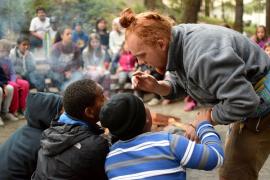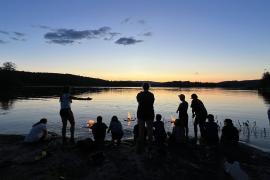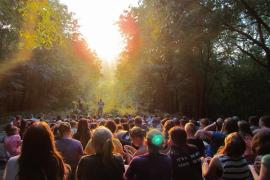Most camps are in full recruitment mode at this point. The black box of staff recruitment continues to be with us as we attempt to identify exactly the right message, compelling argument, or job arrangement that will convince an individual to apply and show up for a summer camp job. Previous blogs have highlighted the significant personal and professional learning experiences that come from a summer camp job. This blog focuses on the persisting questions . . . what do they actually want, and what are we willing to give? While some camp professionals may be ready to pull their hair out, let’s take a look at some Gen Z employment trends that started before the pandemic and now appear to be widespread.
1. Seeking Flexibility
Gen Z has grown up in the time of constant connectivity due to the availability of social media and personal devices. All prior generations, including Millennials, had to adapt to this constant connectivity (Dimock, 2019) — thus it’s no wonder that we have college students fearing the loss of their connection to family and friends for an entire summer. Committing to one job for an entire season that may reduce their network connections can be quite unsettling for many, thus we are seeing more Gen Zers request flexible schedules.
Researchers started noticing Gen Z’s desire for highly flexible schedules and responsibilities well before the pandemic (Singh & Dangmei, 2016). The pandemic may have deepened this desire since organizations demonstrated that flexible work environments were possible given the back-and-forth that occurred between in-person and virtual experiences. However, as we focus more on staff and campers’ mental, emotional, and social health (MESH), flexible schedules that allow a staff member to take a vacation with family or friends may be valuable for all involved parties. When that staff member returns from that time away, they may come back in a refreshed state that leads to a higher level of care for the campers.
After my university’s recent Summer Opportunities Fair, one of my students, who would benefit from a summer camp job, told me that multiple camp organizations stated that staff must commit to an entire summer and may only use the scheduled weekend breaks between programs. This student stopped looking at camps for their summer job because they wanted to take one last weeklong family vacation before their sibling starts military training in August. How can you argue with that desire? I used to be inflexible with those requests as a program supervisor, but I have a difficult time maintaining that perspective knowing that leisure time provides numerous MESH benefits.
2. Seeking Unique Experiences
Gen Z has an entrepreneurial spirit and seeks to create their own identity (Aggarwal et al., 2020). This do-it-yourself attitude propels them to seek flexible, unique experiences (Agarwal & Vaghela, 2018). They push back against labels and seek experiences where they can explore their interests and work toward career goals. While traditional staffing models place individuals in consistent roles for the duration of summer, this arrangement is becoming less appealing to Gen Z.
We may be inclined to place individuals in positions that perfectly match their career aspirations (e.g. music education students with music instruction), however Gen Z seeks opportunities to expand their skills. This generation is motivated and driven to succeed, but they are guarded about their career progression after watching their parents struggle during the Great Recession (Gould et al., 2020). Thus, Gen Z wants to maximize their experiences so they are well-positioned to move their career in multiple directions.
Creating job rotations so staff work through multiple jobs within the same summer may be a way to sell the distinct skill-building experience gained when a person works the entire summer season at camp. For example, a staff member might be a lifeguard, but can you add a rotation of other program areas at certain activity intervals during the day to provide that variety? Gen Z seeks a high degree of personalization in their work experiences (Agarwal & Vaghela, 2018). To what degree can you help them craft a summer work experience that feeds that desire for variety, skill development, and uniqueness?
3. Seeking Transparency and Value Match
Gen Z is quite skeptical of traditional marketing (Sidorchuka & Chesnovicka, 2017) and is likely to search sites like Glassdoor.com where previous employees review their employers (Agarwal & Vaghela, 2018) as well as camp social media profiles. It is important that camps are up front, clear, and consistent about their organizational values. While most individuals seek to work for organizational leaders that have integrity (Schawbel, 2014), Gen Z takes this perspective to a new level and seeks employment opportunities with organizations that match their personal values (Brinke, 2021).
Camps that list value statements will be scrutinized and challenged when staff believe the camp is not living up to that value or operating with little transparency. “They expect to be informed, to be allowed to respond, and to have their responses heard and acknowledged” (Bascha, 2011). There is a fine line that camp professionals’ straddle with informing potential applicants of the entirety of the job, which may turn off individuals, and selling the benefits of the job but not fully explaining the expectations.
Furthermore, during the camp season, camp professionals know that any given day involves a multitude of situations that cannot or should not be communicated widely. This situation must be communicated ahead of time to Gen Z staffers so they can anticipate times of change, flux, or the regular ever-evolving situation we call camp. Ultimately, Gen Z prioritizes honesty and openness from their employers and will not shy away from expressing dissatisfaction with anything less.
4. Seeking to Balance Social Pressures
Similar to their desire for flexibility and unique experiences, peer perception of a Gen Zer’s lifestyle is a real concern for them. This generation has grown up “in public,” as their lives have been broadcast online (Weinswig, 2016). The pressure “to be perceived by peers to lead interesting, fun, and experience-rich lives is real” (Weinswig, 2016, p. 10). Gen Z’s spending habits tend to be focused on experiences worthy of their Instagram persona (Weinswig, 2016). What does this apparent need have to do with camp jobs?
A full summer-long job without breaks or limited internet access pushes staff to choose between losing connectivity and status and a paying job. Remember that earlier generations did not experience this specific issue, as one’s life wasn’t publicly promoted to a wider society. The benefits of working at a summer camp job are well documented by researchers (e.g., Duerden et al., 2014), but remember Gen Z is skeptical of some marketing and communication pushed out by organizations. Camp professionals are encouraged to identify appropriate ways that allow staff to support their “in-public” lives, which may in turn help convince their peers to consider these job opportunities in the future and contribute to the positive social media profile for your camp.
Gen Z is certainly shaking up our traditional staff recruitment and retention practices and their desire for highly individualized experiences may make our heads spin! Industries beyond youth-serving organizations are all trying to identify Gen Z’s work motivations and needs, so we are not alone in this adventure. As you work through these final months of staff recruitment, camp professionals are encouraged to consider additional employment options that address Gen Z’s desire for flexibility, unique experiences, employment transparency, and management of the social pressures they balance daily.
This generation is full of hardworking and socially conscious individuals who desire opportunities that will allow them to learn and make a societal impact. They are simply challenging us to do work in new ways, which is less than simple!
This blog was written on behalf of Project Real Job whose purpose is to support camps in their efforts to recruit, hire, and retain staff.
References
Agarwal, H. & Vaghela, P.S. (2018, December 21-22). Work values of Gen Z: Bridging the gap to the next generation. In INC-2018 National Conference on Innovative Business Management Practices in 21st Century, India.
Aggarwal, A., Sadhna, P., Gupta, S., Mittla, & Rastogi, S. (2020). Gen Z entering the workforce: Restructuring HR policies & practices for fostering the task performance and organizational commitment. Journal of Public Affairs. e2535. DOI: 10.1002/pa.2535
Bascha, Z. (2011). Z: The open source generation. Retrieved February 26, 2022 from https://opensource.com/business/11/9/z-open-source-generation
Brinke, D.T. (2021). Employer attractiveness by Gen Z through organizational values in job applications and social media. [unpublished Master’s thesis]. University of Twente.
Dimock, M. (2019). Defining generations: Where Millennials and Generation Z begins. Pew Research Center, 17(1), 1-7.
Duerden, M. D., Witt, P. A., Garst, B. A., Bialeschki, M. D., Schwarzlose, T., & Norton, K. (2014). The impact of camp employment on the workforce development of emerging adults. Journal of Park and Recreation Administration, 32(1), 26–44.
Gould, D., Nalepa, J., & Mignano, M. (2020). Coaching Generation Z athletes. Journal of Applied Sport Psychology, 32(1), 104-120. DOI: 10.1080/10413200.2019.1581856
Sidorchuka, I. & Chesnovicka, A. (2017, September). Methods of attraction and retention of Generation Z staff. In CBU International Conference Proceedings, 5, 807-814. https://doi.org/10.12955/cbup.v5.1030
Singh, A.P. & Dangmei, J. (2016). Understanding the Generation Z: The future workforce. South-Asian Journal of Multidisciplinary Studies, 3(3), 1-5.
Weinswig, D. (2016, August 29). Gen Z: Get ready for the most self-conscious, demanding consumer segment. Fung Global Retail & Technology, 1-19. https://deborahweinswig.com/wp-content/uploads/2016/08/Gen-Z-Report-2016-by-Fung-Global-Retail-Tech-August-29-2016.pdf
Megan Owens, PhD, is an assistant professor in the Department of Recreation, Park, and Tourism Administration at Western Illinois University. Her multiple camp positions have informed her current role of educator and mentor to young adults preparing to enter the youth development field. Megan's research focuses on the development and facilitation of youth social-emotional learning skills through out of school time programs with a particular emphasis on the youth-adult relationship in summer camps. Megan is a member of the American Camp Association Healthy Camp IV Committee.
The views and opinions expressed by contributors are their own and do not necessarily reflect the views of the American Camp Association or ACA employees.




